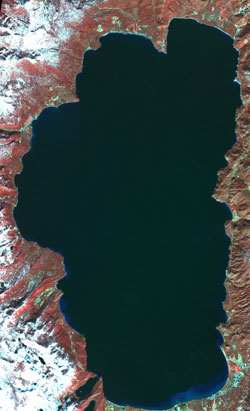Global warming could trigger dramatic Lake Tahoe changes within 10 years
Global warming may turn Lake Tahoe murky
mongabay.com
March 24, 2008
Warming temperatures may cloud Lake Tahoe’s legendary clear waters and put the lake’s native species at risk, reports a new study from the University of California, Davis.
The research projects higher temperatures will alter water circulation in the lake, dramatically altering the conditions for its flora and fauna.
“What we expect is that deep mixing of Lake Tahoe’s water layers will become less frequent, even non-existent, depleting the bottom waters of oxygen. This will result in major, permanent disruption to the entire lake food web,” said Geoffrey Schladow, Director of the Tahoe Environmental Research Center at UC Davis. “A permanently stratified Lake Tahoe becomes just like any other lake or pond. It is no longer this unique, effervescent jewel, the finest example of nature’s grandeur.”
 Lake Tahoe, along the California-Nevada border, is one of the clearest lakes in the world. Since 1965 scientists have been monitoring the water’s clarity, and have discovered a 50% reduction in the last 35 years. This is attributed to increased algal growth, more sediment washed in from the surrounding areas, and urban growth and development. Courtesy of NASA/GSFC/METI/ERSDAC/JAROS and U.S./Japan ASTER Science Team |
Lake Tahoe’s circulation brings deep nutrient-rich waters to nourish algae growth at the surface and spreads oxygen throughout the lake. The mixing cycle takes about 4 years on average, say the researchers.
However models suggest that warming waters could slow and stop the circulation by 2019. The change could result in excessive algae blooms that could cloud the water, deprive lake fish of oxygen, and foul drinking water.
“While we expected that the lake would mix less in the future, learning that we may be only a decade or two from the complete shutdown of deep mixing was very surprising,” Schladow said. “If mixing shuts down, then no new oxygen gets to the bottom of the lake, and creatures that need it, such as lake trout, will have a large part of their range excluded.”







